#russian federation
Text

Радиодевочка
90 notes
·
View notes
Text

MOSCOW, RUSSIAN FEDERATION.
122 notes
·
View notes
Text

“ 'For He made Him who knew no sin to be sin for us, that we might become the righteousness of God in Him.' (2Cor. 5:21) In His death, Christ bore the enmity of the whole world. In doing so, He entered into every hatred and element of bitterness in our lives. St. Sophrony said, 'Christ has descended into the lowest hell and is waiting for His friends to meet Him there.'
We cannot know the One who is love apart from love."
~Fr. Stephen Freeman
(Photo © dramoor 2016, church in Siberia, Russian Federation)
#churches#Lord Jesus Christ#Orthodox Christian#crucifix#travel#Siberia#Russian Federation#photography#photographers on tumblr#Fr. Stephen Freeman#St. Sophrony#Scriptures#Redeemer#Love#God
112 notes
·
View notes
Text



Ministry of Agriculture of the Russian Federation - Building in Kazan, the capital of Tatarstan in the Russian Federation
#ministry of agriculture#building#kazan#the capital#tatarstan#russian federation#russia#rusia#europe#europa
190 notes
·
View notes
Text

Metro Exodus (2019)
#2019#gaming#science fiction#post-apocalyptic#Metro Exodus#Metro#Exodus#Anna Sviatoslavovna Melnikova#Anna Miller#Anna#Artyom#Giulnara Khakimova#Giul#Spartan Order#Russian Federation#sniper
25 notes
·
View notes
Text


[ 📹📸 A Russian military transport plane, was in the process of flying 65 Ukrainian POWs to a location in the Bolgorod oblast to facilitate a prisoner exchange when it was shot out of the sky by Ukrainian missile, killing everyone on board.]
🇺🇦⚔️🇷🇺 🚀🛩️💥 🚨
UKRAINIAN MISSILE SHOOTS DOWN RUSSIAN MILITARY TRANSPORT PLANE FILLED WITH ITS OWN POWs
74 are dead, including 65 Ukrainian POWs, after a Russian military transport plane being used to facilitate a prisoner exchange scheduled for Wednesday was downed somewhere over the Bolgorod region of the Russian Federation, near the border with Ukraine. The prisoner exchange has since been called off by Russian authorities.
In an article published by Ukrainian Pravda, a Ukrainian news periodical, a source is cited as saying that the aircraft was downed by Ukrainian forces near the border with Russia's Bolgorod region, however they have since retracted the source, and are now claiming they cannot confirm the news. The Russian authorities have since confirmed that the plane was in fact downed by a Ukrainian missile, likely using either an American Patriot air defense missile or a German-made Iris-T.
In a statement released by the Ministry of Defense of the Russian Federation, the Russian authorities say that the crash took place at approximately 11:15am (local time), when a Russian Il-76 military transport plane filled with Ukrainian POWs was downed near the Bolgorod region.
“At about 11:00 Moscow time, an Il-76 plane crashed during a scheduled flight in the Belgorod region. On board there were 65 captured Ukrainian Armed Forces servicemen, <including> six crew members and three accompanying persons,” the statement says.
In its statement, the Russian Defense Ministry slammed the missile strike, declaring the "Kiev regime committed a terrorist act" in downing the military transport.
According to Russian sources, the aircraft had been en route from the Chkalovsky military airbase in Moscow, and was shot down by air defenses stationed somewhere in the Kharkov oblast in the northeast of Ukraine, killing everyone on board.
The Russian and Ukrainian authorities had agreed to conduct a prisoner exchange later on Wednesday, with the exchange set to take place near the Russian village of Kolotilovka, also in the Bolgorod oblast, close to the border with Ukraine.
A second military transport aircraft carrying some 80 Ukrainian POWs was turned around before reaching the danger area, and was successfully diverted to another airbase after news of the downing reached Russian authorities.
The Ukrainian officials have so far refused to comment on the crash, remaining mum as news of the event spreads, although Andrey Yusov, a spokesperson for the Main Directorate of Intelligence (GUR) confirmed a prisoner exchange had been scheduled for Wednesday, adding that the exchange has since been cancelled.
#source1
#source2
#source3
#videosource1
#photosource2
@WorkerSolidarityNews
#russian federation#russia#russian news#russia news#ukraine#ukraine news#ukrainian news#ukraine war#war in ukraine#russo ukrainian war#russia ukraine war#russia ukraine conflict#missile strike#downed plane#POWs#war#war news#eastern europe#europe#europe news#european news#politics#news#geopolitics#world news#global news#international news#breaking news#current events#prisoner exchange
27 notes
·
View notes
Text
I brought some flowers today at the Russian embassy in memory of those we lost during the night,the walls were already covered in flowers. Italy has a billion problems,but lack of empathy by it's people is not one of it
8 notes
·
View notes
Text
News of money previously given to House Speaker Mike Johnson's congressional campaign by Russian nationals has re-emerged after the Republican rejected a $95 billion foreign aid bill passed in the Senate.
In 2018, a group of Russians were able to donate to Johnson's bid for the Louisiana seat he eventually won as the money was funneled through the Texas-based American Ethane company.
While American Ethane was co-founded by American John Houghtaling, at the time it was 88% owned by three Russian nationals—Konstantin Nikolaev, Mikhail Yuriev, and Andrey Kunatbaev. Nikolaev is known to be a top ally of Russian President Vladimir Putin.
A spokesperson for Johnson previously assured in 2018 that the campaign returned the money that was given to them by American Ethane once it was "made aware of the situation." There was no indication that Johnson's campaign team willfully broke federal law, which makes it illegal for a campaign to knowingly accept donations from a foreign-owned corporation, a foreign national, or any company owned or controlled by foreign nationals.
A number of social media users have now brought up the campaign money amid Johnson's opposition to the long-debated foreign aid bill, which would send $60 billion to Ukraine as the country continues to fight off Russia's invasion.
In a press conference on February 14, Johnson said he would not bring the bill recently passed by the Senate back from a House vote and that the "Republican-led House will not be jammed or forced into passing" the foreign aid bill.
The same day, Ukraine-based blog Fake Off posted on X, formerly Twitter: "US Speaker of the House Mike Johnson received campaign contributions from American Ethane, a company 88% owned by three Russians. Now, do you understand why he was categorically against the aid to Ukraine?"
Another social media user added, while sharing a clip of Johnson's press conference: "Astonishing that the Speaker of the House for the United States Government accepts money from Russia. Konstantin Nikolaev, Mikhail Yuriev, and Andrey Kunatbaev own 88% of American Ethane."
Johnson's office has been contacted for comment via email.
WHO IS KONSTANTIN NIKOLAEV?
The 52-year-old is a billionaire who previously served as minister of transport for the Russian Federation.
Nikolaev and his two partners currently own a third of Globaltrans, Russia's biggest private rail transport operator, and he previously worked in railroad freight and port businesses.
He is also a part owner of Tula Cartridge Works, which has been supplying ammunition for Russian forces during its invasion of Ukraine.
In 2019, Forbes listed the oligarch's net worth at $1.2 billion.
Nikolaev is also known for being a financial backer of Maria Butina, a Russian citizen who was sentenced to 18 months in prison in 2019 after admitting to acting as an unregistered foreign agent to infiltrate conservative political groups and influence foreign policy to Russia's benefit before and after the 2016 election.
The money that Nikolaev and the other two Russian nationals managed to donate to Johnson's 2018 campaign was also brought up after the Republican was elected House Speaker last October.
"Putin pal Konstantin Nikolaev, who handled Russian spy Maria Butina, was also the principal stockholder in American Ethane Co. when they donated over $37,000 to Mike Johnson's election campaign. Does anyone else think that might be a problem?" posted X user @Davegreenidge57.
#us politics#news#republicans#conservatives#gop#speaker of the house#rep. mike johnson#russia#foreign lobbiest#American Ethane#Konstantin Nikolaev#Mikhail Yuriev#Andrey Kunatbaev#Vladimir Putin#campaign donations#foreign aid bill#Russian Federation#Tula Cartridge Works#Maria Butina#newsweek#2024
7 notes
·
View notes
Link
According to open source researchers, soldiers with roots in poorer regions such as Buryatia and Dagestan are disproportionately represented among Russian casualties in Ukraine.
“Most of the soldiers and officers of the ground forces and the airborne forces come from poor Russian towns and villages,” military specialist Pavel Luzin told Al Jazeera.
“This social-economic stratification has a long-term tradition in the Russian armed forces because young men from the cities with relatively good education serve in other military branches … but the infantry consists of badly-educated soldiers from poor families and regions.”
Buryatia, in Siberia, was once a part of Mongolia that was conquered by Cossacks in the 17th century.
“We can’t determine our own politics – if we had a real federation, the head of our republic could say no, Buryats won’t fight in this criminal war. But he keeps providing cannon fodder for Putin,” Victoria Maladaeva, of the Free Buryatia Foundation, told Al Jazeera.
“Buryatia, like the other ethnic republics, is governed by the colonial policies of Moscow,” Maladaeva continued.
“Our languages and history are disappearing off the face of the Earth, while Moscow sucks all the money and resources out of the provinces. Moscow is a beautiful city but it’s such a facade of all of Russia, because if you go just a little further, the houses are falling apart, there are no roads, there’s no work.”
#russia#ukraine#war#2022#putin#demographics#ethnic#population#populations#buryat#buryatia#dagestan#chechen#chechnya#russian federation#military#history#racism#colonialism#really interesting article#applies to many different militaries
186 notes
·
View notes
Text
Dagestan, Russian Federation
#Dagestan#Not my video#Avar#Russia#Russian federation#World#Dunya#Travel#Video#Kavkaz#Caucasus#Caucasian
94 notes
·
View notes
Text

This particular rashist war criminal lives in Rostov region,,Russian Federation.
Rostov is adjacent to Donetsk and Luhansk regions, Ukraine. It is the site of several “filtration camps” – part of the machinery of the Russian fascist genocide of the Ukrainian people.
#criminalwar#criminalputin#criminal war#russian barbarism#russian war#russian agression#russia ukraine war#help for ukraine#ukraine#war#putin's war#criminal putin#stop invasion#stop russia#stop putin#stop war#russian federation
230 notes
·
View notes
Text

Do svidaniya, grandpapa
75 notes
·
View notes
Text

DOLGOPRUDNYY, RUSSIAN FEDERATION.
59 notes
·
View notes
Photo

there are some cracks in this aging image
#Europe#Russian Federation#Russia#Volgograd#Soviet Art#Soviet heritage#Soviet legacy#Soviet remains#Soviet mural#Soviet painting
25 notes
·
View notes
Text

Horses in Bashkortostan, Russia.
15 notes
·
View notes
Text


What makes Zelenskyy an exceptional leader, according to four experts who’ve seen him up close and personal.
•
•

It’s Not Enough for Ukraine to Win. Russia Has to Lose.
Anything less will encourage Russian imperialism and embolden autocrats around the world.
The Atlantic
Shared via Apple News
#Ukraine#Ukrainian President Volodymyr Zelenskyy#Russian Federation#Russian President Vladimir Putin#World politics#Unrest conflict & war#Armed conflict#Australia#Australian Prime Minister Anthony Albanese#Foreign Affairs#Defence forces#Defence industry
5 notes
·
View notes